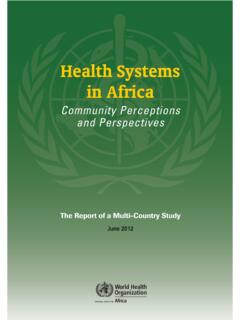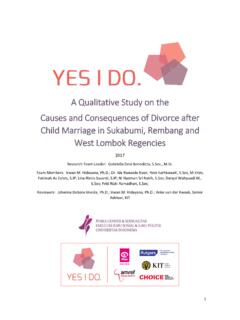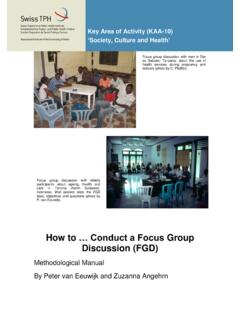Transcription of Social determinants approaches to public health
1 EditorsErik Blas, Johannes Sommerfeld and Anand Sivasankara Kurup Social determinants approaches to public health :from concept to practiceEditorsErik Blas, Johannes Sommerfeld and Anand Sivasankara Kurup Social determinants approaches to public health :from concept to practiceWHO Library Cataloguing-in-Publication DataSocial determinants approaches to public health : from concept to practice / edited by Erik [et al]. factors. care rationing. advocacy. health . , E. , Johannes. Kurup, A. health 978 92 4 156413 7 (NLM classification: WA 525) World health Organization 2011 All rights reserved. Publications of the World health Organization can be obtained from WHO Press, World health Organization, 20 Avenue Appia, 1211 Geneva 27, Switzerland (tel.: +41 22 791 3264; fax: +41 22 791 4857; e-mail: Requests for permission to reproduce or translate WHO publications whether for sale or for noncommercial distribution should be addressed to WHO Press, at the above address (fax: +41 22 791 4806; e-mail: The designations employed and the presentation of the material in this publication do not imply the expression of any opinion whatsoever on the part of the World health Organization concerning the legal status of any country, territory, city or area or of its authorities, or concerning the delimitation of its frontiers or boundaries.))
2 Dotted lines on maps represent approximate border lines for which there may not yet be full mention of specific companies or of certain manufacturers products does not imply that they are endorsed or recommended by the World health Organization in preference to others of a similar nature that are not mentioned. Errors and omissions excepted, the names of proprietary products are distinguished by initial capital reasonable precautions have been taken by the World health Organization to verify the information contained in this publication. However, the published material is being distributed without warranty of any kind, either expressed or implied. The responsibility for the interpretation and use of the material lies with the reader. In no event shall the World health Organization be liable for damages arising from its use.
3 The named authors alone are responsible for the views expressed in this in photos: Column 1. (1) WHO/Erik Blas; Column 2. (1) WHO/Armando Waak; (2) Muhammed al-Jabri/IRIN; Column 3. (1) WHO/Olivier Asselin; (2) David Swanson/IRIN; Column 4. (1) Jason Gutierrez/IRIN; (2) WHO/Evelyn Hockstein; Column 5. (1) WHO/Harold Ruiz; (2) WHO/H. Bower; Column 6. (1) Jaspreet Kindra/IRIN; Column 7. (1) WHO/Chris de Bode; (2) WHO/Christopher photographs in this material are used for illustrative purposes only; they do not imply any particular health status, attitudes, behaviours, or actions on the part of any person who appears in the further information, please contact:Department of Ethics, Equity, Trade, and Human Rights health (ETH) World health Organization 20, Avenue Appia, CH-1211 Geneva 27, e-mail: this bookThe thirteen case studies contained in this publication were commissioned by the research node of the Knowledge Network on Priority public health Conditions (PPHC-KN), a WHO-based interdepartmental working group associated with the WHO Commission on Social determinants of health .
4 The publication is a joint product of the Department of Ethics, Equity, Trade and Human Rights (ETH), Special Programme for Research and Training in Tropical Diseases (TDR), Special Programme of Research, Development and Research Training in Human Reproduction (HRP), and Alliance for health Policy and Systems Research (AHPSR). The case studies describe a wealth of experiences with implementing public health programmes that intend to address Social determinants and to have a great impact on health equity. They also document the real-life challenges in implementing such programmes, including those in scaling up, managing policy changes, managing intersectoral processes, adjusting design and ensuring sustainability. This publication complements the previous publication by the Department of Ethics, Equity, Trade and Human Rights entitled Equity, Social determinants and public health programmes, which analysed Social determinants and health equity issues in 13 public health programmes, and identified possible entry points for interventions to address those Social determinants and inequities at the levels of socioeconomic context, exposure, vulnerability, health outcomes and health consequences.
5 The book is a joint initiative of the WHO Department of Ethics, Equity, Trade and Human Rights (ETH), Special Programme of Research, Development and Research Training in Human Reproduction (HRP), Special Programme for Research and Training in Tropical Diseases (TDR), and the Alliance for health Policy and Systems Research (AHPSR). The authors of the various chapters of the book are listed below:Carlos Acosta-Saal, Ajmal Agha, Irene Agurto, Halida Hanum Akhter, Laura C. Altobelli, Erik Blas, Chris Bonell, Joanna Busza, Jia Cheng, Uche Ezeoke, Abigail Hatcher, James Hargreaves, Patrick Harris, Sara Javanparast, Heidi Bart Johnston, Kausar S Khan, Julia Kim, Kathi Avery Kinew, Jaap Koot, Amanda Meawasige, Romanus Mtung e, Jane Miller, Linda Morison, Joel Negin, Elizabeth Oliveras, Obinna Onwujekwe, Benjamin Onwughalu, Godfrey Phetla, John Porter, Paul Pronyk, Lorena Rodriguez, Anna Schurmann, Evie Sopacua, Stephanie Sinclair, Johannes Sommerfeld, Siswanto Siswanto, Anand Sivasankara Kurup, Tony Lower, Jan Ritchie, Vicki Strange, Graham Tabi, Ye im Tozan, Daniel Umeh, Benjamin Uzochukwu, James Ogola Wariero, Charlotte Watts, Su Xu, Isabel Zacar as.
6 Shaokang Zhan and Chanjuan study design and implementation team consisted of Erik Blas, Johannes Sommerfeld, Sara Bennett, Shawn Malarcher and Anand Sivasankara Kurup. Bo Eriksson, Jens Aagaard-Hansen and Norman Hearst reviewed and provided inputs to the publication at different stages. Valuable inputs in terms of contributions, peer reviews and suggestions on various chapters were also received from a number of WHO staff at headquarters, regional offices and country offices, as well as other partners and collaborators. The editors would like to acknowledge specifically the contributions of Marco Ackerman, Anjana Bhushan, Davison Munodawafa, Benjamin Nganda, Sarah Simpson, Susan Watts, Erio Ziglio and Ramesh Shademani. The editorial team consisted of Erik Blas, Johannes Sommerfeld and Anand Sivasankara Kurup.
7 The text was copyedited by Bandana Malhotra and publication design and layout was done by Netra health of a population is measured by the level of health and how this health is distributed within the population. The WHO publication from early 2010, entitled Equity, Social determinants and public health programmes analysed from the perspective of thirteen priority public health conditions their Social determinants and explored possible entry points for addressing the avoidable and unfair inequities at the levels of socioeconomic context, exposure, vulnerability, health -care outcome and Social consequences. However, the analysis needs to go beyond concepts to explore how the Social determinants of health and equity can be addressed in the real world. This publication takes the discussion on Social determinants of health and health equity to a practical level of how programmes have actually addressed the challenges faced during implementation.
8 Social determinants approaches to public health : from concept to practice is a joint publication of the Department of Ethics, Equity, Trade and Human Rights (ETH), Special Programme for Research and Training in Tropical Diseases (TDR), Special Programme of Research, Development and Research Training in Human Reproduction (HRP), and Alliance for health Policy and Systems Research (AHPSR). The case studies presented in this volume cover public health programme implementation in widely varied settings, ranging from menstrual regulation in Bangladesh and suicide prevention in Canada to malaria control in Tanzania and prevention of chronic noncommunicable diseases in Vanuatu. The book does not provide a one-size-fits-all blueprint for success; rather, it analyses from different perspectives and within different contexts programmatic approaches that led to success or to failure.
9 The final chapter synthesizes these experiences and draws the combined lessons learned. These lessons include: the need for understanding equity as a key value in public health programming and for working not only across sectors but also across health conditions. This requires a combination of visionary technical and political leadership, an appreciation that long-term sustainability depends on integration and institutionalization, and that there are no quick fixes to public health challenges. Programmes must get out of their comfort zones and, in addition to applying traditional biomedical and programmatic tools, they have to learn to address the economic, Social , cultural and political realities in which public health conditions and inequities common lesson learned from all the analysed cases is to not wait to identify what went right or wrong until after the programme has elapsed or failed.
10 Research is a necessary component of any implementation to routinely explore, gauge, and adjust strategies and approaches in a timely manner. We believe that this publication will inspire programme managers, policy-makers and researchers to work hand-in-hand to launch new and better public health programmes and to further strengthen existing Blas Johannes Sommerfeld Anand Sivasankara KurupForewordviAHPSR Alliance for health Policy and Systems ResearchAKU Aga Khan UniversityALGON Association of Local Governments of NigeriaAMC Assembly of Manitoba ChiefsANIS I Anthropometric Nutritional Indicators SurveyARI acute respiratory infectionsASIST applied suicide intervention skills trainingAusAID Australian Agency for International DevelopmentBAPSA Bangladesh Association for the Prevention of Septic AbortionBCC behaviour change communicationBWHC Bangladesh Women s health CoalitionCEPS cultural, economic.
















